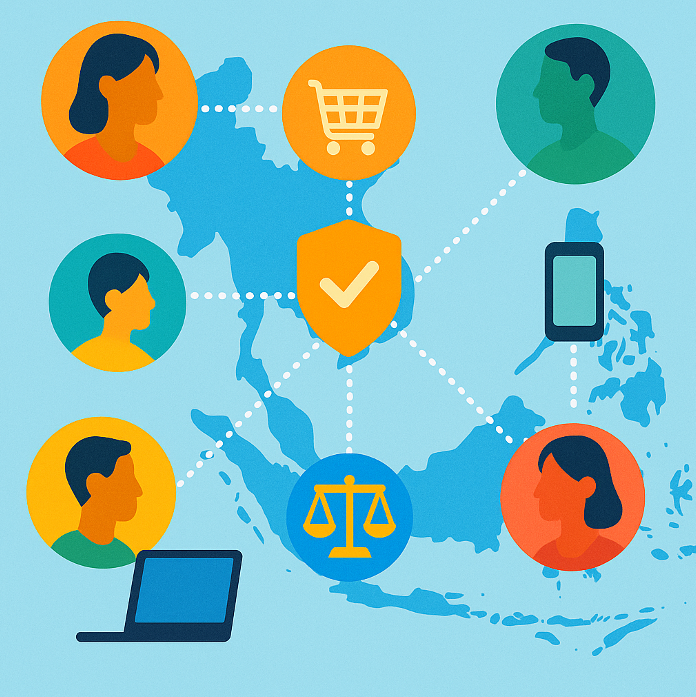By Suhong Yang
This blog post is adapted from the author’s presentation at the 10th Biennial Conference of the Asian Society of International Law in Hanoi, Vietnam from 9 to 10 October 2025.
Mediation is an important means, for peaceful settlement of international disputes, which is stipulated in various treaties including the UN Charter. The nature of the mediating process promotes the preservation of relationships between the parties and aims to achieve win-win results rather than an adversarial approach where one side must win and the other must lose. On 30 May 2025, the signing ceremony of the Convention on the Establishment of the International Organization for Mediation (IOMed, IOMed Convention, respectively) was held in the Hong Kong Special Administrative Region of the People’s Republic of China after two to three years of preparatory work, during which 33 countries, mostly from Africa, Asia, and Latin-America, signed the IOMed Convention. The Convention entered into force on 29 August 2025, following ratification by China, Nicaragua, and Venezuela. The IOMed became operational on 20 October 2025. Presently, the total number of signatory countries has reached 37.
The IOMed is the first intergovernmental organization dedicated to resolving international disputes through mediation. It is also the first international organization headquartered in Hong Kong, a development which has the potential to raise the international profile of Hong Kong as a “capital” for mediation in the world, and strengthen the role of Hong Kong as a hub for international dispute settlement, building on its strong foundation in international arbitration.
This blog highlights the potential of IOMed in global dispute resolution, and reflects on critical perspectives to offer constructive suggestions.
1. Complementing international dispute settlement regime
The IOMed is unique as it is the first permanent intergovernmental organization that is solely focused on settling international disputes through mediation, including State-to-State, investor-State, and commercial disputes. Considering the scope of cases, the IOMed may be seen as the mediation counterpart to the Permanent Court of Arbitration . The IOMed is important as it can provide mediation services to States as a case party, which is a feature included in the mandates of only a few institutions. While Hong Kong has established itself as a hub for commercial disputes, the IOMed augments Hong Kong’s role in public international law by mediating disputes among States. Moreover, the IOMed provides an additional mechanism to settle disputes among Belt and Road Initiative participants, facilitating those in favor of non-confrontational resolution methods.
In addition, capacity building is an important area of work for the IOMed. The IOMed will promote the use of mediation to settle disputes with international character, which in turn encourages coordination and cooperation with governments, international organizations, and other entities. According to the IOMed Convention, it will organize forums and conferences on mediation, which will build a platform for communication and information sharing. It may run a mediation fellowship program, cultivating young professionals and diplomats; and it may establish a Mediation Fund to promote and encourage the use of mediation and enhance capacity building.
2. Promoting harmonious international relations
The IOMed offers a forum for consensual and culturally sensitive dispute resolution, especially for interstate disputes, with the potential to promote harmonization of international relations. For example, many countries in Asia tend to make reservations to dispute settlement provisions in multilateral treaties thereby triggering the jurisdiction of the International Court of Justice. There is also a general trend of inactive participation among Asian countries in international litigation forums, especially on public international law issues. Mediation would fit more with the culture of non-confrontation in many Asian countries, and Asian countries may have more comfort and confidence in mediation rather than settling interstate disputes by litigation.
3. Enhancing voices from Global South in international law
The Global South has historically been underrepresented in the formation and governance of key international institutions. Similarly, most dispute resolution mechanisms in international law remain dominated by Global North actors. The underrepresentation of the Global South raises concerns over the legitimacy and inclusivity of international law-making and its application. The economy of Hong Kong is close to the Global North, whereas the location of Hong Kong connects to the Global South. Hong Kong can be a perfect place where the West meets the East, and to empower voices from the Global South in international lawmaking and global governance.
The IOMed enables more Global South nations to participate in institutional building of international dispute resolution. Current founding members of the IOMed are mostly developing countries. The mediators designated under the IOMed Convention represent an emerging epistemic community distinct from traditional international law practitioners. Under Article 20, each State Party nominates a specified number of mediators from among its nationals. Mediators from the South will be nominated.
4. Challenges and way forward
Despite many uniqueness and potential discussed above, the IOMed may also face some challenges.
To begin with, there was a lack of participation from major countries during the negotiation of the IOMed Convention. Although the IOMed can provide services for non-Member States, its ability to attract diverse global membership, including Western countries, will be crucial for its credibility. Second, as the IOMed is new, there is no provision referring disputes to the IOMed in existing treaties and conventions, even though parties can submit their disputes to the IOMed based on mutual consent. The IOMed needs to conduct significant outreach activities to promote its services. Third, Hong Kong itself has little political or diplomatic capital, which is essential to the mediation of interstate disputes, as mediation is very much a matter of influence. It is important to build and increase the political capital in Hong Kong if the IOMed aims to play a serious role in settling interstate disputes. Fourth, it is up to the parties to submit their disputes for mediation, and it is not yet known whether mediation would be a preferred means of dispute resolution. Nonetheless, as a dedicated and permanent platform, the IOMed offers one more option for disputing parties to use mediation services. Lastly, there are various organizations that provide services to settle international commercial disputes. The IOMed needs to show its strengths to disputing parties and attract cases.
Looking ahead, it would be essential for the IOMed to make efforts in the following aspects. First, it should ensure perceived neutrality, avoiding perceptions of excessive influence from any single geopolitical power. Second, it should build institutional credibility, attract high-profile cases, and demonstrate effectiveness in resolving complex disputes. Third, it needs to integrate existing mechanisms and, collaborate with global and regional established bodies. Fourth, it should adopt fast, cheap, and effective procedures to attract disputing parties. Fifth, when developing its procedures, it should endeavor to incorporate different legal cultures and traditions, such as those of Asia and Africa.
About the author
Dr Suhong Yang is a Global Academic Fellow at the Faculty of Law, University of Hong Kong. Her academic interests include public international law, international dispute settlement, and international criminal law.
Social media handles: LinkedIn Suhong Yang, X [Twitter] @olivia_shy.
Image credit: Freepik





